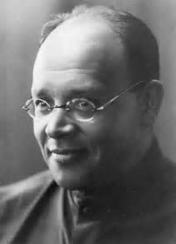 My first blog post of the new year is inspired by a passage written by the Russian Jewish author Isaac Babel, which I came across while doing research for a new book that I am starting this year. Babel was born in Odessa, in present-day Ukraine. He initially embraced the Russian Revolution, welcoming the new freedoms that Jews experienced under the Bolsheviks – the Pale of Settlement, where Jews were confined to living under the Tsars – was dissolved, quotas for schools, universities and professions were abolished and censorship ended. Like many other artists and writers, Babel became an ardent Bolshevik, but found himself increasingly out of favour during the rule of Joseph Stalin, who led the Soviet Union from 1924. Stalin promoted the bland Socialist Realist artistic style and the exciting, experimental art and literature of the immediate pre- and post-revolutionary years was brutally supressed. Unwilling to leave Mother Russia and follow his wife and daughter into exile in Paris, Babel was eventually shot in 1940, during Stalin’s purges, following a brief show trial. His name and work were erased in the Soviet Union until 1954, when he was rehabilitated during the so-called ‘thaw’ under Nikita Khrushchev. The passage below is a wonderful illustration of the contradictions that people – perhaps Jews especially – felt about the revolution. It comes from the short story Gedali, which forms part of Babel’s Red Cavalry collection. The Red Cavalry stories describe snapshots from Babel’s experience as a war correspondent during the 1920 campaign by the newly formed Soviet Red Army to invade Poland and spread socialist revolution to neighbouring countries. We sit down on some empty beer barrels. Gedali winds and unwinds his narrow beard. His top hat rocks above us like a little black tower. Warm air flows past us. The sky changes colour – tender blood pouring from an overturned bottle – and a gentle aroma of decay envelops me. “So let’s say we say ‘yes’ to the Revolution. But does that mean that we’re supposed to say ‘no’ to the Sabbath?” Gedali begins, enmeshing me in the silken cords of his smoky eyes. “Yes to the Revolution! Yes! But the Revolution keeps hiding from Gedali and sending gunfire ahead of itself.” “The sun cannot enter eyes that are squeezed shut,” I say to the old man, “but we shall rip open those closed eyes!” “The Pole has closed my eyes,” the old man whispers almost inaudibly. “The Pole, that evil dog! He grabs the Jew and rips out his beard, oy, the hound! But now they are beating him, the evil dog! This is marvellous, this is the Revolution! But then the same man who beat the Pole says to me, ‘Gedali, we are requisitioning your gramophone!’ ‘But gentlemen,’ I tell the Revolution, ‘I love music!’ And what does the Revolution answer me? ‘You don’t know what you love, Gedali! I am going to shoot you, and then you’ll know, and I cannot not shoot, because I am the Revolution!’” “The Revolution cannot not shoot, Gedali,” I tell the old man, “because it is the Revolution.” “But my dear Pan! The Pole did shoot, because he is the counterrevolution. And you shoot because you are the Revolution. But Revolution is happiness. And happiness does not like orphans in its house. A good man does good deeds. The Revolution is the good deed done by good men. But good men do not kill. Hence the Revolution is done by bad men. But the Poles are also bad men. Who is going to tell Gedali which is the Revolution and which the counterrevolution? I have studied the Talmud. I love the commentaries of Rashi and the books of Maimonides. And there are also other people in Zhitomir who understand. And so all of us learned men fall to the floor and shout with a single voice, ‘Woes unto us, where is the sweet Revolution?’”
0 Comments
Leave a Reply. |
Keeping stories aliveThis blog aims to discuss historical events relating to the Jewish communities of Ukraine, and of Eastern Europe more widely. As a storyteller, I hope to keep alive stories of the past and remember those who told or experienced them. Like so many others, I am deeply troubled by the war in Ukraine and for the foreseeable future, most articles published here will focus on the war, with an emphasis on parallels with other tumultuous periods in Ukraine's tragic history. Archives
March 2024
Categories
All
|
 RSS Feed
RSS Feed
